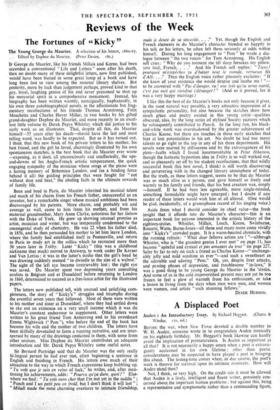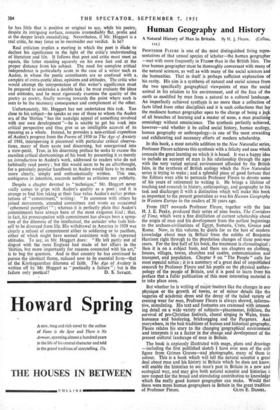A Displaced Poet
Auden : An Introductory Essay. By Richard Hoggart. (Chatto & Windus. t 2s. 6d.) BEFORE the war, when New Verse devoted a double number to W. H. Auden, someone wrote in to congratulate Auden ironically on his eightieth birthday. Mr. Hoggart's book likewise can hardly avoid the implication of prematureness. Is Auden as important as all that? It is not necessarily a, happy omen when a poet is extrava- gantly acclaimed in his Own lifetime ; other than poetic considerations may be suspected to have played a part in bringing this about. The testing-time comes when, in due course, the poet's work is thrown for survival upon its intrinsic resources. How will Auden stand then?
Not, I think, so very high. On the credit side it must be allowed that Auden is a lively, intelligent and fluent writer, genuinely con- cerned about the important human problems ; but against this, being a representative and symptomatic rather than a commanding figure, he has little that is positive or original to say, while his poetry, despite its intriguing surface, remains irremediably flat, prolix and at the deeper levels unsatisfying. Nevertheless, if Mr. Hoggart is a real critic, he may force us to reconsider our verdict. Is he?
Real criticism implies a meeting in which the poet is Made to declare his significance in the light of the critic's understanding of literature and life. It follows that poet and critic must meet as equals, the latter standing squarely on his own feet and . at the proper distance from his subject. The need for complete critical independence is particularly acute in the case of a writer such as Auden, in whom the poetic constituents are so confused with a. complex of extra-poetic ideas, opinions and attitudes. The critic who would attempt the interpretation of this writer's significance must be prepared to undertake a double task ; he must evaluate the ideas and attitudes, and he must rigorously examine the quality of the poetry as poetry, finally moving towards the point where each is seen to be the necessary consequence and complement of the other.
Unfortunately, Mr. Hoggart has not undertaken this task. Too close to his subject—he speaks as one of those to whom the Auden era of the 'thirties " has the nostalgic appeal of something involved with our own development "—he is unable to get his work into critical perspective and thus give us an intelligible account of its meaning as a whole. Instead, he provides a non-critical exposition of Auden's progress from the Poems of 1930 to The Age of Anxiety of 1948, interspersing it piecemeal with particular critical observa- tions, many of them acute and discerning, but unorganised into a view-point. True, in his disarming preface he seeks to excuse the manifest critical shortcomings of his book by presenting it as merely an introduction to Auden's work, addressed to readers who do not habitually read poetry ; but this would seem to be an afterthought, for a genuinely popular handbook to Auden would have to be much more clearly, simply and enthusiastically written. This one, ambiguous in intention, succeeds neither as criticism nor publicity.
Despite a chapter devoted to " technique," Mr. Hoggart' never really comes to grips with Auden's quality as a poet ; and it is strange to find him taking at their face value Auden's earlier protes- tations of "commitment," writing: "In common with others he joined movements, attended committees and wrote an occasional ephemeral pamphlet' ; whereas it is perfectly plain that Auden's commitments have always been of the most exiguous kind ; that, in fact, his preoccupation with commitment has always been a symp- tom of the dilemma of the intellectual, the outsider who feels him- self to be divorced from life. His withdrawal to America in 1939 was clearly a refusal of commitment either to soldiering or to pacifism, either of which might have seemed consistent with his expressed attitudes. To say, as Mr. Hoggart does: "He left partly out of disgust with the mess England had made of her affairs in the 'thirties, but more importantly for reasons connected with his art," is to beg the question. And in that country he has continued to pursue the identical theme, reduced now to its essential form—that of the Kierkegaardian dilemma of faith. The Age of Anxiety is written off by Mr. Hoggart as " poetically a failure " ; but is the



































 Previous page
Previous page